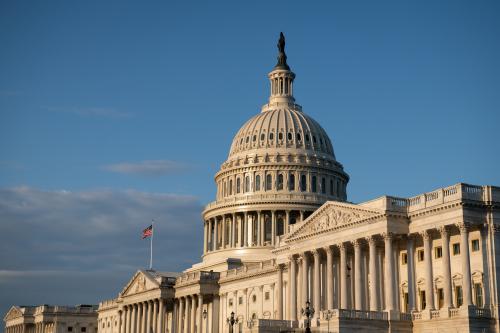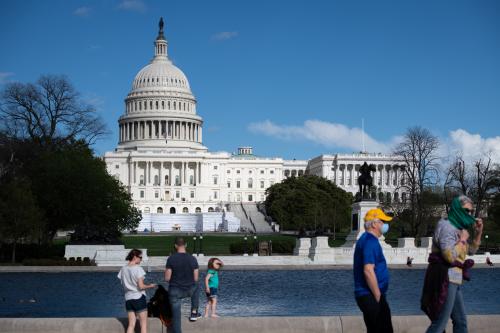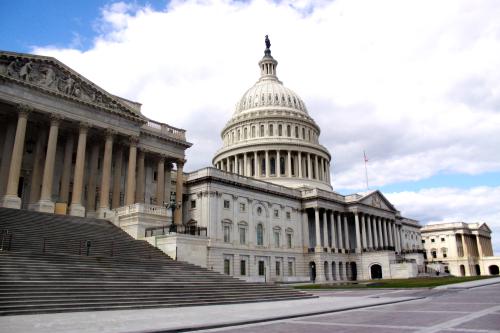Oversight actions in this article have been identified by the Brookings House Oversight Tracker.
On September 10 congressional Democrats released a withering bicameral staff report alleging the misuse of taxpayer funds by Centers for Medicare and Medicaid Services (CMS) Administrator Seema Verma and her staff on private communications consultants. In addition to describing troubling behavior, the report includes multiple examples of an important approach available to congressional committees seeking to oversee the executive branch: soliciting information from private companies with knowledge of agency actions.
Since Democrats took control of the House of Representatives last year, committees’ oversight requests have frequently been met with refusals by Trump administration officials to attend hearings, lengthy back-and-forth correspondence negotiating the release of documents, and drawn-out court cases. These dynamics are not unique to the 116th Congress, but they have certainly made it more difficult for the House to obtain information about conduct of the Trump administration, leading House Democrats to turn frequently to private, non-governmental actors with knowledge of executive branch activities as part of vital oversight inquiries.
Since the start of the second session of the 116th Congress in January 2020, House Democrats have sent 55 oversight inquiries to non-government actors about executive branch behavior, as compared to only 18 in the first session during 2019.[1] While a significant part of this recent increase can be attributed to oversight related to the COVID-19 pandemic—including investigations into the disbursement of Paycheck Protection Program loans and production of a vaccine—House Democrats have also targeted private companies in investigations on policy topics as wide-ranging as predatory student loan behavior and attempts to degrade emissions standards set by the Clean Air Act.
In many cases, House committees are approaching private actors in conjunction with efforts to obtain desired information directly from the executive branch. The CMS inquiry described above, for example, began in March 2019 when Democratic leaders sent letters to Secretary of Health and Human Services Alex Azar and Seema Verma requesting documents and communications related to the contracts in question. In a December 17, 2019 follow-up letter, the same members of Congress reiterated their request for certain documents that had not been turned over and expressed frustration with the lack of cooperation from HHS and CMS leadership.
With only mixed success in obtaining information directly from administration officials, committee staff turned to private contractors who had been advising CMS activity. In the staff report, footnotes indicate transcribed interviews and a briefing from employees at the consulting companies in question. While these sessions are not publicized in the same way as letters or hearings, they still serve as an important component of the oversight process. In many cases, transcribed interviews serve as the basis for further, more public investigative work—such as in the case of the 2019 impeachment inquiry.
Part of what can make this method of oversight so successful is that private companies cannot, at present, rely on the same executive privilege arguments as administration officials when it comes to withholding information on government activity from the legislative branch, nor do they have the same partisan incentives for doing so. In another staff report released in July by the Subcommittee on Economic and Consumer Policy (Committee on Oversight and Reform), for example, Chairman Raja Krishnamoorthi (D-Calif.) relied on a quick response from a letter sent to Philips Respironics CEO Vitor Rocha to uncover details on an uncompetitive federal contract for ventilators his company signed with HHS in April.
Committees can then use the information they obtain from private-sector sources to exert pressure back on the executive branch. After releasing the staff report, Krishnamoorthi requested an HHS Inspector General investigation into the issuance of the Philips contract and sent two letters on August 13 inviting Rocha and Assistant to the President Peter Navarro to be witnesses at a September 16 hearing. On September 1, HHS elected to cancel the contract and the proposed hearing is no longer scheduled to take place.
Finally, outreach to private companies can be an additional way for Democrats in the Senate to participate in substantive bicameral oversight investigations. Since congressional operations became increasingly remote in March, Democratic senators have already been more likely to sign onto letters from House committees. Since Democrats do not control committee gavels in the Senate, their executive-branch inquiries are not held to the same legal standard as legislative inquiries from Democratic chairs in the House. Private companies, however, may still feel inclined to respond to members of Congress in the minority party, especially leading up to an election that may flip control of the chamber. Information shared across chambers can lead to coauthored staff reports like the inquiry into CMS Administrator Verma’s communications consultants.
Cooperation between the legislative branch and private companies with knowledge of executive branch activity is not new. However, the use of this investigatory power, and the subsequent publication of its success, has been an important component of the House Democrat’s oversight toolbox. With at least four more months of divided government, this behavior is likely to continue.
[1] Oversight letters to non-government actors were identified by removing all letters with recipients in the executive branch as well as state and territory officials. This count also omits letters unrelated to federal agency activity such as correspondence included in the House Judiciary Committee investigation into “Threats Against the Rule of Law” and oversight related to the Mueller investigation.
This work is licensed under the Creative Commons Attribution-NonCommerical-NoDerivatives 4.0 International License. To view a copy of the license, visit https://creativecommons.org/licenses/by-nc-nd/4.0/.








Commentary
Congress finds success targeting private actors for information on executive branch actions
September 29, 2020